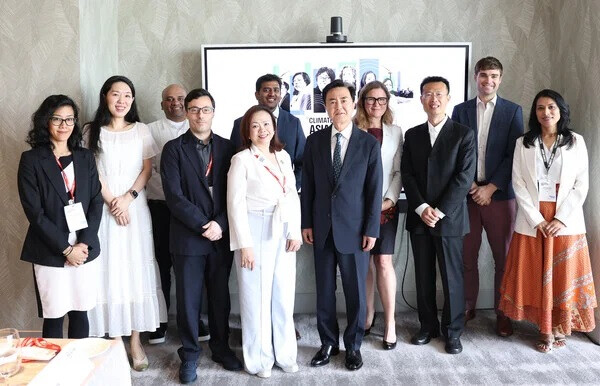
Singapore – Governor Kim Tae-heum of South Chungcheong Province has issued a stark warning regarding the escalating electricity demands fueled by the rapid advancement of artificial intelligence (AI), advocating for comprehensive energy innovation policies across all enterprises within his province. His remarks came during his participation in the 'Enhancing Energy Efficiency EP100 Roundtable' in Singapore, where he underscored the critical need for immediate and decisive action to mitigate the burgeoning energy crisis.
Governor Kim, currently in Singapore to attend the Asia Climate Action Summit in his capacity as the Asia-Pacific Regional Chair of the Under2 Coalition, joined a distinguished panel of international experts and corporate leaders at the Mandarin Oriental Hotel on May 8th. The EP100 initiative, spearheaded by the Climate Group, the secretariat of the Under2 Coalition, aims to galvanize corporate commitment to energy efficiency, thereby curtailing carbon emissions and accelerating the transition to clean energy sources.
The roundtable convened approximately 20 influential figures, including Nicholas Kellen, Senior Manager of Energy Systems at the Climate Group; Hadrianus Bivec, Senior Manager of Southeast Asia at Carbon Trust; Esther An, Chief Sustainability Officer at City Developments; and Soruchi Keradmand, Global Sustainability Lead at Schneider Electric. The agenda featured a keynote presentation by Hadrianus Bivec, followed by keynote addresses from Esther An, Soruchi Keradmand, and Governor Kim, culminating in an interactive discussion session.
In his keynote address, Governor Kim articulated his motivation for attending the roundtable, stating, "As the Asia-Pacific Regional Chair of the Under2 Coalition, I felt compelled to attend this pivotal meeting to absorb the insights of leading experts and contribute to the global discourse on energy efficiency."
He then drew attention to the devastating California wildfires he witnessed during a recent visit to the United States, emphasizing the escalating urgency of the climate crisis. "The sheer scale of the disaster was both shocking and deeply distressing, underscoring the relentless encroachment of climate change. We must forge a unified front to avert irreversible consequences," he asserted.
Governor Kim further highlighted the unprecedented surge in electricity demand driven by AI and evolving industrial paradigms. "The relentless advancement of AI and transformative industrial shifts necessitate a two-to-threefold increase in clean energy supply. Enhancing energy efficiency is paramount to achieving carbon neutrality," he emphasized.
He also provided context regarding South Chungcheong Province's unique position, noting, "South Chungcheong Province is a pivotal industrial hub, ranking second in South Korea's exports and third in gross regional domestic product (GRDP). Manufacturing accounts for 55% of our economy, and we are the nation's second-largest energy consumer, hosting half of South Korea's coal-fired power plants. We are committed to pioneering carbon neutrality initiatives, recognizing that our province's actions will resonate throughout the nation."
Governor Kim unveiled South Chungcheong's ambitious carbon neutrality targets, stating, "We are committed to achieving carbon neutrality by 2045, five years ahead of the national mandate. Our strategy encompasses the development of a hydrogen city ecosystem, the deployment of offshore wind, pumped-storage, and solar energy solutions, and the goal of achieving 90% renewable energy utilization by 2035 and 100% by 2045."
He concluded his address by underscoring the growing importance of energy efficiency as a competitive advantage in the market economy. "South Chungcheong Province will facilitate the dissemination of energy efficiency best practices from large corporations to small and medium-sized enterprises, thereby fostering a province-wide culture of energy innovation."
During the discussion, Governor Kim addressed the fiscal and regulatory constraints faced by South Korean local governments compared to their counterparts in the United States and Germany. He also outlined plans to establish a carbon neutrality fund, mirroring initiatives aimed at fostering startups, venture companies, and smart livestock complexes.
He also critiqued the gap between rhetoric and action among central governments in Europe and the United States, citing electoral pressures and substantial financial outlays as impediments to tangible progress. He advocated for increased investment in carbon neutrality research and development to accelerate the transition to sustainable energy.
Governor Kim also emphasized the importance of: promoting open-source technology sharing, delineating clear roles for central and local governments, and incentivizing collaboration between large corporations and small and medium-sized enterprises. He urged the Climate Group to broaden its engagement with developing nations in Asia.
He extended a special invitation to the Climate Group to attend the Carbon Neutrality International Conference, scheduled to take place in South Chungcheong Province in September, highlighting its role as a platform for knowledge exchange and collaboration.
[Copyright (c) Global Economic Times. All Rights Reserved.]




























